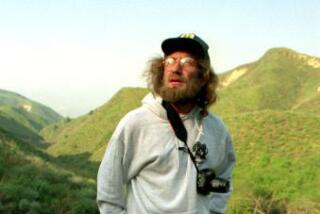Biochemist Will Share Ecology-Science Prize
- Share via
Biochemist Bruce Ames of the University of California, Berkeley, who developed a test that helps prevent cancer-causing substances from reaching the marketplace, and an international organization dedicated to preserving tropical ecosystems will share the Tyler Prize for 1985, splitting a cash award of $150,000.
The prize, regarded as one of the world’s top awards for environmental scientists and leaders, will be awarded Saturday night at a banquet at Chasen’s restaurant.
Ames will share the award with the Organization for Tropical Studies, a consortium of four Costa Rican and 29 North American research universities and institutions. Dr. Peter H. Raven will accept the award in behalf of the organization, of which he is president.
The winners were selected by “an independent panel of educators and scientists of international reputation,” according to the University of Southern California, which administers the John and Alice Tyler Ecology-Energy Prize.
Developed Ames Test
Ames developed the “Ames Test,” an inexpensive method that is usually reliable in determining which substances are most likely to become carcinogenic. It is used in about 3,000 laboratories around the world, Ames said in a telephone interview.
The test, which costs only “a few hundred dollars” to administer, has helped industries eliminate carcinogenic substances at an early stage, especially in the manufacturing of chemicals and pesticides, he said. The test is about 80% to 90% effective in identifying mutagenic substances--called “mutagens.” Many mutagens are carcinogenic because they cause cancer by damaging DNA, the genetic material in cells.
Since he developed the test in the early 1970s, Ames has turned his attention toward identifying anti-carcinogens, substances that could prevent cancer by blocking some substances from turning mutagenic. Fat, for example, becomes rancid and mutagenic as it oxidizes. Vitamin E, “which is one of nature’s antioxidants, will stop this process,” he said.
Surprisingly, Ames believes “very little” cancer is caused by man-made chemicals and pollution, and most cancer probably results from naturally occurring mutagens.
Cancer Causes
Ames is crusading these days for a better public understanding of the causes of cancer, arguing that people should not be too alarmed every time some substance is identified as carcinogenic. In most cases, the quantities required to cause cancer in humans are enormous.
“Our tests show the world is just absolutely full of mutagens,” he said. “People are getting a slightly different view of the world. More and more of us are coming to the conclusion that pollution is probably a pretty minor thing.”
Of far greater concern, he said, is cigarette smoking, which is “the big wolf out there,” and natural substances in the diet.
The organization that Ames shares the prize with this year is involved in an area that many ecologists consider crucial: the protection of the world’s dwindling tropical regions. The Organization for Tropical Studies, founded 22 years ago, is designed to improve understanding of ecological conditions in the tropics, and to protect that environment whenever possible.
In addition to training 1,500 graduate students in tropical ecology, the organization maintains three field stations in Costa Rica. It also played a key role in establishing the Zona Protectora, an important habitat that stretches from the mountain tops to the Costa Rican shoreline, encompassing a rich variety of wildlife.






